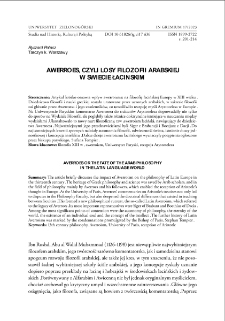Zielonogórska Biblioteka Cyfrowa udostępnia 65 553 obiektów cyfrowych
Obiekt
Tytuł: Awerroes, czyli losy filozofii arabskiej w świecie łacińskim = Averroes or the fate of the Arab philosophy in the Latin language world
Współtwórca:
Tytuł publikacji grupowej:
Streszczenie:
Artykuł omawia krótko wpływ awerroizmu na filozofię łacińskiej Europy w XIII w. Dziedzictwo filozofii i nauki greckiej zostało uratowane przez uczonych arabskich, w zakresie filozofii zaś głównie przez Awerroesa i jego zwolenników, co umożliwiło recepcję myśli Arystotelesa w Europie. Na Uniwersytecie Paryskim komentarze Awerroesa do traktatów Arystotelesa doprowadziły nie tylko do sporów na Wydziale Filozofii, ale pogłębiły także różnice doktrynalne istniejące w nauczaniu między wydziałami. ; Ukształtowało to nowy nurt filozoficzny, tzw. awerroizm łaciński, nawiązujący do dziedzictwa Awerroesa. Najważniejszymi jego przedstawicielami byli Siger z Brabancji i Boecjusz z Dacji. Do najistotniejszych kwestii spornych należały autonomia filozofii, odwieczność świata, istnienie duszy jednostkowej i koncepcja intelektu. Dalsze dzieje awerroizmu łacińskiego wyznaczyły potępienia ogłoszone przez biskupa paryskiego, Stefana Tempier.
Abstract:
The article briefly discusses the impact of Averroism on the philosophy of Latin Europe in the thirteenth century. The heritage of Greek philosophy and science was saved by Arab scholars, and in the field of philosophy mainly by Averroes and his followers, which enabled the reception of Aristotle's thought in Europe. At the University of Paris, Averroes` commentaries on Aristotle`s treatises not only led to disputes in the Philosophy Faculty, but also deepened the doctrinal differences that existed in teaching between faculties. ; This formed a new philosophical current, the so-called Latin Averroism, which referred to the legacy of Averroes. Its most important representatives were Siger of Brabant and Boethius of Dacia. Among the most significant points of contention were the autonomy of philosophy, the eternity of the world, the existence of an individual soul and the concept of the intellect. The further history of Latin Averroism was marked by the condemnations promulgated by the Bishop of Paris, Stephan Tempier.
Wydawca:
Zielona Góra: Oficyna Wydawnicza Uniwersytetu Zielonogórskiego
Format:
Identyfikator zasobu:
DOI:
Strony:
Źródło:
In Gremium : studia nad historią, kulturą i polityką, tom 17
Jezyk:
Prawa do dysponowania publikacją:
Biblioteka Uniwersytetu Zielonogórskiego
Identyfikator oryginału:
Kolekcje, do których przypisany jest obiekt:
- Zielonogórska Biblioteka Cyfrowa > Repozytorium > Jednostki organizacyjne > Wydział Humanistyczny
- Zielonogórska Biblioteka Cyfrowa > Repozytorium > Typy utworów > Artykuły
- Zielonogórska Biblioteka Cyfrowa > Repozytorium > Czasopisma naukowe i serie wydawnicze UZ > In Gremium. Studia nad Historią, Kulturą i Polityką
Data ostatniej modyfikacji:
26 lut 2025
Data dodania obiektu:
26 lut 2025
Liczba wyświetleń treści obiektu:
192
Wszystkie dostępne wersje tego obiektu:
https://www.zbc.uz.zgora.pl/publication/92712
Wyświetl opis w formacie RDF:
Wyświetl opis w formacie OAI-PMH:
Obiekty Podobne
Greloff, Jakub Młyńczyk, Łukasz red.
Dobies, Anna Kaczor, Monika - red. nauk. Kładoczny, Piotr - red. nauk.
Tumarkin, Anna Pavlovna (1875-1951) Kiejzik, Lilianna - red. Husak, Bogumiła - tł. Cygankov, Andrej Pavlovič (1964- ) - tł.
Kopa, Dawid Sztyber, Radosław - red. nacz.
Sinani, Gjergj
Mukoid, Ewa Walczak, Paweł - red. nauk.
Szóstak, Anna Ruszczyńska, Marta - red. nauk. Pałucka-Czerniak, Iwona - red. nauk.

